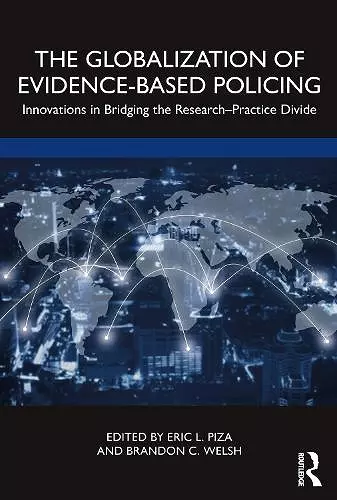The Globalization of Evidence-Based Policing
Innovations in Bridging the Research-Practice Divide
Brandon C Welsh editor Eric L Piza editor
Format:Paperback
Publisher:Taylor & Francis Ltd
Published:30th Nov '21
Currently unavailable, and unfortunately no date known when it will be back
This paperback is available in another edition too:
- Hardback£145.00(9780367461959)

Evidence-based policing is based on the straightforward, but powerful, idea that crime prevention and crime control policy should be based on what works best in promoting public safety, as determined by the best available scientific evidence. Bringing together leading academics and practitioners, this book explores a wide range of case studies from around the world that best exemplify the integration of scientific evidence in contemporary policing processes.
Chapters explore the transfer of scientific knowledge to the practice community, the role of officers in conducting police-led science, connection of work between police researchers and practitioners, and how evidence-based policing can be incorporated in daily police functions. The Globalization of Evidence-Based Policing is written for both researchers and practitioners interested in ensuring that scientific research is at center stage in policing. Agencies (including law enforcement agencies, research centers, and institutions of higher learning) can look to these case studies as road maps to better foster an evidence-based approach to crime prevention and crime control. Those already committed to evidence-based policing can look to these chapters to ensure that evidence-based policing is firmly institutionalized within their agencies.
Accessible and compelling, this book is essential reading for all those interested in learning more about and doing more to bring about evidence-based policing.
Evidence-based policing is here to stay — that's how the editors of this collection begin their final chapter. The preceding 19 chapters back up that claim. The book is full of thoughtful discussion and concrete examples from numerous countries across four continents, written by leading practitioners and academics. Well done!
- Gary Cordner, Academic Director, Education and Training Section, Baltimore Police Department
Piza and Welsh’s exceptional book, The Globalization of Evidence-Based Policing,brings together an amazing set of scholars and practitioners. It is a master class that anyone holding a position of responsibility in the policing world — police executives, city managers, consultants, oversight officials, and academics — should be required to read.
- John Eck, Professor, University of Cincinnati
Piza and Welsh's comprehensive volume is a remarkable contribution to the "next generation" of evidence-based policing. We have amassed an extensive evidence-base establishing the effectiveness of various policing policies, practices, and reform efforts, and this book offers clear guidance on how researchers, police agencies, and communities can collaborate to ensure the benefits of these approaches can be realized in practice.
- Charlotte Gill, Associate Professor, George Mason University
A distinctive feature of evidence-based policing is that understanding the implementation of proven strategies shares equal billing with rigorous evaluation. Lists of promising projects lead nowhere without the hard work of change agents, and Piza and Welsh’s The Globalization of Evidence-Based Policing illustrates how leadership, staff buy-in, partnership building, and community involvement are needed to make what works really work!
- Wesley Skogan, Professor Emeritus, Northwestern University
As the role of policing in a democratic society continues to evolve, and the challenges of policing a multi-racial society become more complex, this volume offers insight and inspiration, enriched by scholarship from around the world. The imperative of bridging the divide between research and practice reverberates through every chapter. We can only hope that readers will follow this exhortation.
- Jeremy Travis, Executive Vice President of Criminal Justice, Arnold Ventures and President Emeritus, John Jay College of Criminal Justice
Evidence-based policing is here to stay—that's how the editors of this collection begin their final chapter. The preceding 19 chapters back up that claim. The book is full of thoughtful discussion and concrete examples from numerous countries across four continents, written by leading practitioners and academics. Well done!
Gary Cordner, Academic Director, Education and Training Section, Baltimore Police Department
Piza and Welsh’s exceptional book, The Globalization of Evidence-Based Policing,brings together an amazing set of scholars and practitioners. It is a master class that anyone holding a position of responsibility in the policing world—police executives, city managers, consultants, oversight officials, and academics—should be required to read.
John Eck, Professor, University of Cincinnati
Piza and Welsh's comprehensive volume is a remarkable contribution to the "next generation" of evidence-based policing. We have amassed an extensive evidence-base establishing the effectiveness of various policing policies, practices, and reform efforts, and this book offers clear guidance on how researchers, police agencies, and communities can collaborate to ensure the benefits of these approaches can be realized in practice.
Charlotte Gill, Associate Professor, George Mason University
A distinctive feature of evidence-based policing is that understanding the implementation of proven strategies shares equal billing with rigorous evaluation. Lists of promising projects lead nowhere without the hard work of change agents, and Piza and Welsh’s The Globalization of Evidence-Based Policing illustrates how leadership, staff buy-in, partnership building, and community involvement are needed to make what works really work!
Wesley Skogan, Professor Emeritus, Northwestern University
As the role of policing in a democratic society continues to evolve, and the challenges of policing a multi-racial society become more complex, this volume offers insight and inspiration, enriched by scholarship from around the world. The imperative of bridging the divide between research and practice reverberates through every chapter. We can only hope that readers will follow this exhortation.
Jeremy Travis, Executive Vice President of Criminal Justice, Arnold Ventures and President Emeritus, John Jay College of Criminal Justice
ISBN: 9780367461966
Dimensions: unknown
Weight: 360g
332 pages